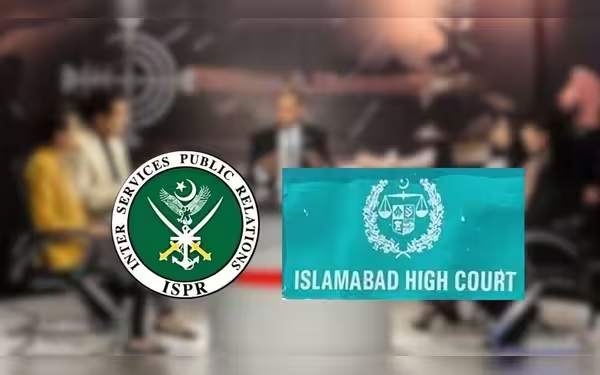Saturday, September 28, 2024 08:17 PM
High Court Questions ISPR Control Over Defence Analysis in Pakistan
- IHC challenges ISPR's authority on defence analysts.
- PEMRA notification limits expert participation in defence discussions.
- Debate on military influence versus media independence intensifies.
 Image Credits: thecurrentpk
Image Credits: thecurrentpkIHC questions ISPR's control over defence analysis, raising concerns about media independence and military influence in Pakistan.
The Islamabad High Court (IHC) has recently raised important questions regarding the control of the military over defence analysis in Pakistan. This issue came to light during a hearing of a petition filed by Colonel (retd) Inamul Rahim Advocate. The petition challenged a notification issued by the Pakistan Electronic Media Regulatory Authority (PEMRA) on April 4, 2019, which stated that retired army officers could only appear as defence analysts on television after obtaining clearance from the Inter Services Public Relations (ISPR).
Justice Babar Sattar, while presiding over the case, questioned the legal authority of ISPR to dictate who can provide defence analysis on television. This inquiry is significant as it touches upon the broader themes of freedom of speech and the role of military influence in civilian matters. The notification in question has raised eyebrows, as it seems to limit the pool of experts who can discuss defence issues, potentially stifling diverse opinions and analyses.
The requirement for ISPR clearance has been a point of contention among media professionals and analysts alike. Critics argue that this practice undermines the independence of the media and restricts the ability of qualified individuals to contribute to important discussions about national security. On the other hand, proponents of the notification may argue that it is necessary to maintain a certain level of control over sensitive information related to defence.
As the IHC continues to deliberate on this matter, it is crucial for the public to understand the implications of such regulations. The outcome of this case could set a precedent for how defence matters are discussed in the media and who gets to participate in these discussions. It raises the question: should the military have the final say in who can speak on defence issues, or should there be a more open and inclusive approach?
The Islamabad High Court's inquiry into the ISPR's authority over defence analysts is a pivotal moment for media freedom in Pakistan. It highlights the ongoing struggle between military oversight and civilian discourse. As citizens, it is essential to stay informed and engaged with these developments, as they directly impact our understanding of national security and the role of the media in shaping public opinion.













